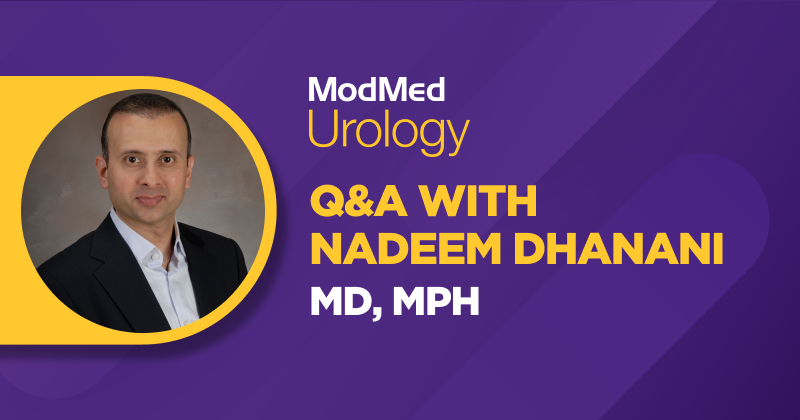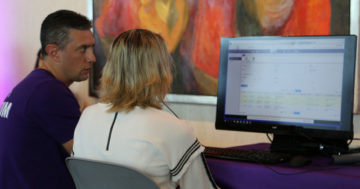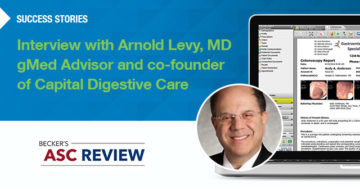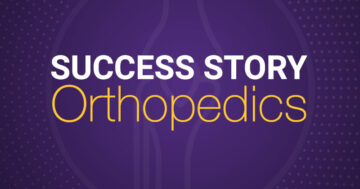Catching Up With Our Medical Director of Urology

Dr. Nadeem Dhanani has been working with ModMed® ever since we decided to bring our solutions to the urology medical specialty. He codes our software and designs many of the workflows our clients have come to rely on to be more efficient and provide excellent patient care. Recently, we sat down with Dr. Dhanani to see how his approach has shaped our EHR software solutions for urology and what he thinks the future will bring for the specialty as a whole.
The interview below has been edited for length and clarity.
ModMed: Who or what inspired you to get involved in urology?
Dr. Dhanani: In medical school, I wanted to be involved in the surgical field in some way. I was drawn to the technical aspect of surgery and specifically, cancer surgery. When I discovered urology and urologic oncology, I found that a lot of the diseases that are treated in urology are actually curable if treated with the right surgery at the right time on the right patient. Things like kidney cancer, you can cure; testicular cancer, fantastic opportunity to cure; prostate cancer, bladder cancer — and these are oftentimes in stark contrast to malignancies in other specialties.
As I learned more about urology, I saw the different types of technology that were used: robotics, endoscopy, lasers, different types of energy, combined medicine and surgery. It’s very heavy on physiology as well — what the kidneys do in terms of stone disease and renal blood flow, and the endocrine aspects of testicular and adrenal function. I liked it, it had a broad range, yet it allowed me really to hone in my interest to surgical oncology, in a subject matter that was satisfying to me.
ModMed: How did you get involved with ModMed?
Dr. Dhanani: I am somebody who is quite focused on efficiency, whether it is workflow efficiency or efficiency at home. For example, I always know where my keys are. I know when I arrive home, I do this, and then I do this…it’s efficient and reliable. That’s just how I approach things. It’s how my mind works.
These traits really shined through during my oncology fellowship. We had a lot of different protocols related to how patients were managed and triaged and how our notes were drafted for different situations.
I developed an organized way for all of us to create and generate these notes, and my method was soon adopted as the new standard. As a result, everyone knew which part of the note to go to for various cases when we were in discussions at conferences.
Fast-forward to a few years later when I was transitioning from Boston to Texas, and Dave Lehman, a friend from medical school, told me about the work he was doing in ENT with this great company. He said, “You’ve got to take a look because they want to go into urology.” ModMed represented an opportunity to work with the subject matter of urology, which I love, while using technology to improve efficiencies, minimize practice pattern variation, and optimize standardization. It was everything, all in one. Then I met Michael Sherling, one of the ModMed founders. I loved his vision and the company, and that’s why I joined.
ModMed: Can you talk about your role in designing and coding ModMed Urology? What is your approach?
Dr. Dhanani: I think I am very deliberate about making it as generalizable to our specialty as possible. It’s urology-specific, but at the same time, I want it to be something every urologist can relate to, even when choosing the words, the descriptors and the structure within the software. I want to make sure that it’s not just catering to my urology practice or a group of urology practices. If you’re a urologist, you should be able to look at our software and it should feel right to you. It’s a customized solution that is also generalizable to our specialty.
ModMed: Are there other consultants who are assisting us with ModMed Urology?
Dr. Dhanani: Mark Painter of PRS is somebody who is well regarded as a urology billing and coding thought leader. He has been a fantastic resource for us. Our team bounces ideas off of him, and we’ve also tapped into his expertise to help specific clients improve their billing and workflows. He’s great because he’s not just billing and coding, he consults on overall practice consulting and efficiencies as well. It’s a great partnership, one that I hope will continue to grow.
We’re also pleased to welcome Eric Tygenhof, MD, FACS, of Southland Urology, to the ModMed family. As urology team lead, Dr. Tygenhof will work with me to collaborate with our clients and build the best possible solutions for ModMed Urology.
ModMed: Can you speak to how ModMed Urology supports our clients from implementation and onboarding to training and ongoing support?
Dr. Dhanani: It’s truly an individualized process. No two clients are treated the same, because no two clients have the same needs. They have different structures, different sizes, different numbers of partners, different roles. Some use scribes, others do the documentation themselves, and some use dictation. All of these different nuances affect how a new client will most effectively interact with our software and our technology. That’s why we do a deep dive and learn about the practice first. Then, based on our assessment, we tailor a specific approach to onboarding, training and ongoing support.
After that initial onboarding session is done, there is often a specific point person assigned to a practice. The doctors also have my personal contact information. It’s not uncommon for me to receive texts throughout the day from our customers. When they start doing a new procedure they want to know if we can add something to our software or a new medication. Or I might get a request to chat for five minutes later in the week. That type of collaboration is something our company provides, and we love it. The more we can establish that dialogue, that engagement with our customers, the more we’re able to continue making this custom product even more customized.
ModMed: Why do you want your peers to know about ModMed Urology? What sets this software apart from what’s already out there?
Dr. Dhanani: Our software is truly embracing the level of technology that we have today and bringing that into medicine. We’re way beyond glorified word processing systems and antiquated processes.
Our company understands that when urologists are efficient while documenting, and documenting accurately, we can use that to improve our ability to manage our time and spend time where it should be spent — with our patients, or when we’re done with our patients, our families. ModMed Urology uses point-of-care guidance to allow its customers the opportunity to provide best-in-class care and improve quality.
Medicine is changing at light speed. A small fraction of what I do today pertains to what I did or learned in medical school, or even in residency for that matter. That fund of knowledge continues to grow exponentially, and our need to consume and use data effectively continues to grow. Information is key. Our software captures data within the natural workflows of what a urologist does on a day-to-day basis and then processes that information so it can be consumed by the user as helpful information, helpful analytics and helpful guidelines. ModMed Urology does this in a way that is designed to enhance the patient experience and those interactions, instead of hindering them.
This is just where we are today. When you look at where we are today, and where we’re going to be 12 months from now, 24 months from now, I believe it’s truly (at the risk of being cliche) Modernizing Medicine.
ModMed: Do you believe this software can make a difference for practices? If so, how?
Dr. Dhanani: ModMed Urology is designed to give practices the ability to access and document information in an easy and efficient way. If you’re able to do that, and make decisions based on the data that’s in front of you, you’re promoting good patient care while freeing up your time for what matters most.
ModMed: What are you seeing on the horizon for urology and healthcare technology?
Dr. Dhanani: I think there’s going to be a continued focus on personalizing care and therapeutics that optimize efficacy and minimize morbidities.
ModMed: Are you working on any exciting projects with the ModMed Urology team right now that you’d like to talk about?
Dr. Dhanani: We’re going to continue to enhance our timeline functionality. We want to make it even easier for providers to see and digest a patient’s clinical history at a glance, and then use that information to document a visit efficiently.
Interested in learning more about our comprehensive software suite for urology practices? Experience it today!
About Nadeem Dhanani, MD, MPH, Medical Director of Urology at ModMed
Dr. Nadeem Dhanani is a practicing urologist and medical director of urology at ModMed, with over 20 years of experience.
He completed subspecialty fellowship training in urologic oncology at the National Cancer Institute on the campus of the National Institutes of Health. Later, he was the chief of urology at Harvard Vanguard Medical Associates, in Boston, in addition to serving on the faculty at Harvard Medical School and as a member of the Dana-Farber / Harvard Cancer Center. He was also on staff at Beth Israel Deaconess Hospital and the director of robotic surgery at Mount Auburn Hospital.
Dr. Dhanani has a specific interest in medical innovation and device design. In addition to being named to the Houston Business Journal’s 40 Under 40 list in 2013, Dr. Dhanani was awarded a Cancer Prevention & Research Institute of Texas grant for prevention and early detection for bladder cancer research in collaboration with the Rice School of Engineering.
This blog is intended for informational purposes only and does not constitute legal or medical advice. Please consult with your legal counsel and other qualified advisors to ensure compliance with applicable laws, regulations, and standards.







